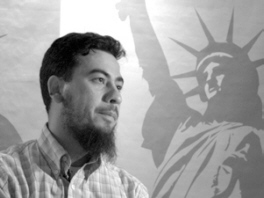|
||||
|
|
|
|||
| Home | Subscribe | Back Issues | The Organization | Volunteer | Do Something | ||||
|
||||
|
Edmonds Pharmacist Seeks End to Harassment at BorderInnocent citizen is falsely listed on terrorism watch listFROM THE ACLU OF WASHINGTONAn Edmonds, WA pharmacist who is falsely listed on a federal terrorism watch list as "armed and dangerous" is suing to end Shimrote Ishaque, a US citizen of Pakistani origin, today joined a class-action lawsuit filed by the American Civil Liberties Union that seeks to insure that innocent Americans are not subjected to Repeated humiliating and unnecessary actions when re-entering the United States after travel abroad. In the lawsuit, Ishaque is joining nine other citizens who have been subjected to repeated lengthy stops, questioning, body searches, handcuffing, excessive force, separation from family members and confinement by customs officers when they return to the United States-treatment stemming in part from an inaccurate database maintained by the government. Even the Department of Justice has acknowledged that the database includes information on many people who pose no threat to our nationís safety. The suit seeks improvements to the Federal Bureau of Investigationís Terrorist Screening Center and policies of Customs and Border Protection. The suit was filed in federal district court in Chicago. "The government should not treat innocent Americans as terrorists. When an individual poses no security threat, he should not keep getting detained and interrogated at the border," said ACLU of Washington staff attorney Aaron Caplan, one of the attorneys representing Ishaque. Shimrote Ishaque was born in Cambodia to a Muslim family of Pakistani descent. The family immigrated to the US as refugees when Ishaque was 7 years old. He was naturalized in 1986 at age 14. His wife and two young children are US citizens. He has no criminal history or involvement with terrorists. He has been employed as a pharmacist since earning his degree from the University of Washington in 1998. An observant Muslim, Ishaque is active with his mosque and attends international religious conferences. In June 2004, he and several friends returning from a regional conference in Vancouver, BC were detained at the Blaine checkpoint for four hours. In August 2004, Ishaque experienced a similar four-hour delay at SeaTac airport when returning from an Islamic conference in Trinidad. He was again stopped at SeaTac when returning from Pakistan with his family in April 2005. Each time he was eventually cleared and allowed to re-enter the country. On January 29, 2006, after spending the weekend in Vancouver, BC, Ishaque was driving through the border checkpoint at Blaine while dressed in traditional religious clothing. He handed his passport to the officer at the booth, who ran a computer check of the ID number. After reading his computer screen, the officer drew his pistol, pointed it at Ishaque, and ordered him to get out of the car. His car was quickly surrounded by over 20 other officers, many with guns drawn. Ishaque feared that he would be shot or even killed. He was also embarrassed and humiliated by the incident because it signaled to the surrounding motorists that he in particular, and Muslims in general, were terrorists who should be taken into custody. Inside the building, Ishaque was told that he was being held because the computer identified him as "armed and dangerous." At one point, he was questioned about a leaflet found in his car: a know-your-rights flyer published by the Council on American-Islamic Relations with text taken from the ACLU. Ishaque was released after 90 minutes. When Ishaque asked what information was in his file that caused this reaction, he was told the information could not be released. Ishaque asked if he should expect similar treatment at the border in the future, and he was told that it could not be ruled out. Ishaque's legal complaint builds on an ACLU of Illinois lawsuit filed last year by Akif Rahman, a native-born US citizen. Since March 2004, Rahman was detained and questioned by Department of Homeland Security (DHS) officials on several occasions as he re-entered the country after business or personal trips abroad. Four of the detentions lasted from two to six hours, longer than was reasonably required for determining Rahman’s identity and allowing him to proceed into the United States. On one occasion, Rahman was subjected to unnecessary excessive force during a body search and shackled to a chair for approximately three hours while isolated from his wife and children. The plaintiffs represent thousands of innocent individuals who are stopped, questioned, abused and harassed at points of entry to the country each year- action that results from flaws in the federal governmentís Terrorism Screening Center (TSC). According to a US Department of Justice report, the TSC administers a database with more than 200,000 names, persons who are claimed by the government to have "any degree of terrorism nexus." The report points out that the process for classifying these individuals is flawed, resulting in many individuals being considered dangerous when they pose no real threat to our nation. None of the plaintiffs has ever been charged with a criminal act or been the subject of any indictment or action related to a terrorism investigation. The amended complaint comes today in a lawsuit filed o Rahmanís behalf in June 2005. The plaintiffs ask the federal court to order the FBI and DHS to adopt policies that ensure expeditious reentry to the United States. |
|

